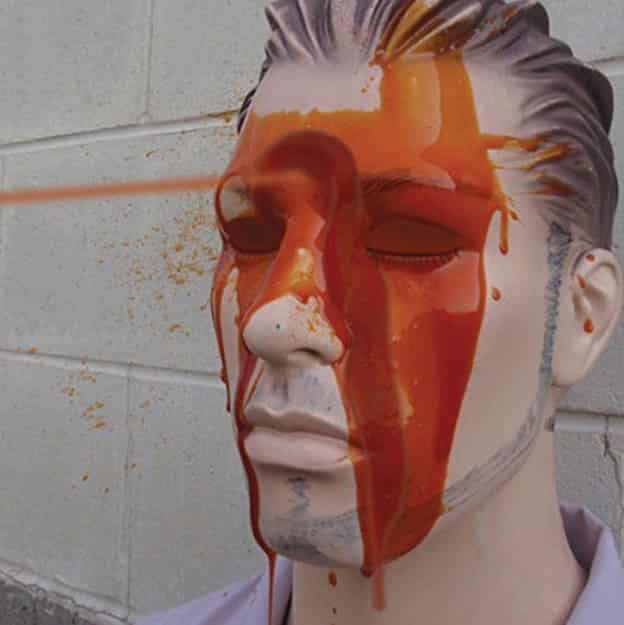
A Guide To Making Pepper Spray At Home
Because pepper spray is one of the most effective non-lethal forms of self-defense.
Potent enough to stop a threat in their tracks.
That’s why it’s worth learning how to make your own pepper spray:
TOPICS IN THIS ARTICLE… ↓(click to jump)
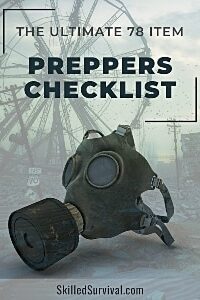
Want a free 78 item preppers checklist?
Enter your email below to instantly download this Complete Checklist PDF. No purchase necessary. 👇 👇First, A Couple of Notes Of Caution
Homemade Pepper Spray Won’t Be As Effective
Before we make pepper spray, I want to temper your expectations.
Homemade pepper spray works, but it won’t be as effective as the stuff you can buy.
Why? For two reasons:
1. Commercial Brands Will Be Stronger and Spray Further
First, the top-of-the-line pepper sprays are manufactured with specialty machines in controlled settings.
This means the manufacturers can fine-tune the recipes and achieve maximum effectiveness.
Second, the spray bottles and trigger mechanisms are better designed than you can develop at home.
They can package the pepper spray into bottles under intense pressure.
This allows for longer-range spray patterns, which equals better self-defense.
Here’s an example:
1. FOX Labs Pepper Spray
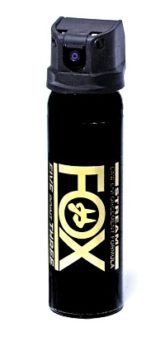
It was about a man hospitalized after eating one Carolina Reaper.
It’s said to be the hottest chili pepper known to man – at around 2,000,000 Scoville Heat Units!
This pepper causes intense dry heaves, blinding headaches, and some near-stroke symptoms.
But what if the “pepper” in a pepper spray was that powerful?
FOX Labs is measured at 5,300,000 SHU – an astounding 265% hotter than the Carolina Reaper!
It can spray this blinding defense up to 17 to 20 feet.
FOX Labs Pepper Spray is used by Police, Law Enforcement, Security, and Military agencies worldwide.
2. There Are Risks Involved In DIY Pepper Spray
Anytime you DIY, there are risks.
The most obvious one here is an accidental discharge.
This stuff is meant to burn so that it won’t feel good.
You also need to make it in a well-ventilated area.
If you (or anyone helping) have difficulty breathing, buy some pepper spray instead.
Breathing intense chili pepper heat can cause problems with respiration.
↓ 5 Most Powerful Pepper Spray / Best For Self-Defense
Prepper Spray Ingredient List
Pepper spray comprises 2 main ingredients: Capsaicin and a liquid.
Capsaicin is an oil extracted from chili peppers. It’s the active ingredient in pepper spray. It’s the heat.
But to “spray” this heat, it must be mixed with a liquid.
Now you have basically three liquid options to choose from: Water, Alcohol, or Vinegar.
Water is cheaper and more readily available.
However, alcohol and vinegar help to stabilize the capsaicin oil and increase the shelf life of the mixture.
Selecting Your Peppers
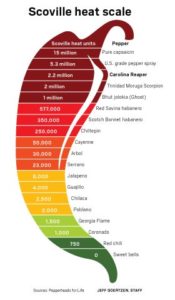
Generally, the hotter the pepper, it is better for making pepper spray.
So you want to source extremely hot peppers but ones that won’t break the bank to acquire.
One of the lowest Scoville unit pepper is the bell pepper.
Yes, it’s technically a “pepper,” but it won’t be effective for self-defense purposes – move on.
You must move up to at least the Cayenne Pepper to get into enough heat for self-defense.
While this pepper will burn and irritate an assailant’s eyes, it’s not likely to stop them in their tracks.
The next level up would be the Red Savina Habanero; the heating unit has increased significantly and will give you some decent time to escape an attack.
At the top of the Scoville scale is the Carolina Reaper.
These will stop a would-be attacker or looter in their tracks.
The burn factor will last a considerable amount of hours.
This will give you plenty of time to subdue your attacker.
↓ Peppers comparison! List of Hottest Chili Peppers On Earth
It’s not always feasible to get all of these types of peppers.
But the main objective isn’t to maim; it’s to stun your attacker long enough to get to safety or deter them from proceeding further.
How To Make Pepper Spray At Home
Safety First
You must wear rubber gloves and safety goggles when making your pepper spray.
This is to protect your hands and eyes from the oil.
I can not stress this enough—unless you are immune to capsaicin, you do not want this oil near your skin or eyes.
Also, wear a mask to prevent inhalation of the vapors, especially if you are sensitive to strong odors or allergic to peppers.
You must find a refillable spray bottle and check it for leaks.
Do not let the spray bottle drip all over your bug-out pack, purse, or car.
You will also need at least six chilis; the hotter, the better.
You need one bulb, two tablespoons of minced garlic, or two tablespoons of powdered garlic.
You will also need a stove or food dehydrator to dry the chilies.
If you are on the run, a solar oven will also work.
The best-case scenario has a stockpile already started of dried chili peppers.
The first step is to dry your peppers in a food dehydrator, a low-temperature oven, or a solar oven.
Once the peppers have been dried, add them to a blender or chop them as finely as possible, then place them in a bowl.
Mix & Blend
Next, you want to add the garlic, followed by two tablespoons of baby oil, which helps the spray adhere to your attacker’s clothes.
And finally, twelve ounces of vodka or vinegar increases the pepper spray’s shelf life.
If you are using a blender, blend on high for two minutes.
If you do it by hand, mash until it’s a smooth paste.
Be careful to avoid spilling the paste.
Then, you should pour the mixture into a large bottle using a funnel and let it sit overnight in a cool place.
The mixture needs to be reduced to increase its effectiveness.
This is an important part of the process of how to make pepper spray at home.
The next morning, you will need a funnel, cheesecloth, and a water bottle.
Place the funnel in the 20-ounce container you wish to use as a storage vessel, then place the cheesecloth over the funnel.
Pour the pepper mixture into the bottle very carefully.
Finally, add another twelve ounces of alcohol or vinegar, and there you have it.
That, my friends, is how to make your own pepper spray.
The pepper spray you have made should be stored in the refrigerator or a cool place.
If the need arises, it’s ready to pour immediately, and you are ready to defend yourselves.
Since we have used vinegar or alcohol, this mixture should last anywhere from a month to three months.
↓ How to Make Pepper Spray
It’s Time To Clean Up
Now that you have made your pepper spray, it’s time to clean up any containers, the blender, or the grinder.
Capsaicin is an oil; plain old soap and water aren’t going to get rid of the residue.
You will need a solution of bleach and water.
This will help counteract the oils left behind in all the containers.
To clean your blender or grinder, you will need a solution of mineral oil, dish soap, and hot water.
Let the solution soak for about thirty minutes to ensure all traces have been lifted from the plastic.
We all know plastic holds not only odors but can also trap oils.
A word of caution:
When you make your pepper spray, wear protective goggles and gloves in case of any splashing.
Just remember you can make pepper spray with powdered or ground peppers.
Not just by using homegrown or store-bought dried peppers.
Equally important is the intent to get the maximum use of the peppers and garlic combined to stop an assailant.
So get yourself a bottle of FOX Labs Pepper Spray.
You’ll be hard-pressed to find a more high-powered pepper spray at this price.
Why Trust Skilled Survival...
Go here now to review a full breakdown of:
- Who We Are
- Our Credentials
- Our Mission
- & Product Recommendations...
Here are a few highlights of our teams credentials & certifications:
- Certified Member of a Mountain Search & Rescue Organization
- Plant Emergency & Safety Leader for a Major Food Manufacturer
- Member of the 10TH Mountain Division Hut Association
- Certifications: Avalanche 1, WFR, CPR
- Official Gear Tester for Numerous Outdoor Gear Companies
- Countless Multiday Backpacking trips into Remote Wilderness
- Bachelor's Degree In Mechanical Engineering
- Bachelor's Degree In Civil Engineering
- Bachelor's Degree In Biomedical Engineering
"It takes 20 years to build a reputation and five minutes to ruin it." - Warren Buffett
We're fully aware that trust is NOT something you GET but is EARNED.
And we'll continue to earn YOUR trust through our forthright and honest approach with each new Blog Post, Guide & Product we create...
Prepare, Adapt & Overcome,

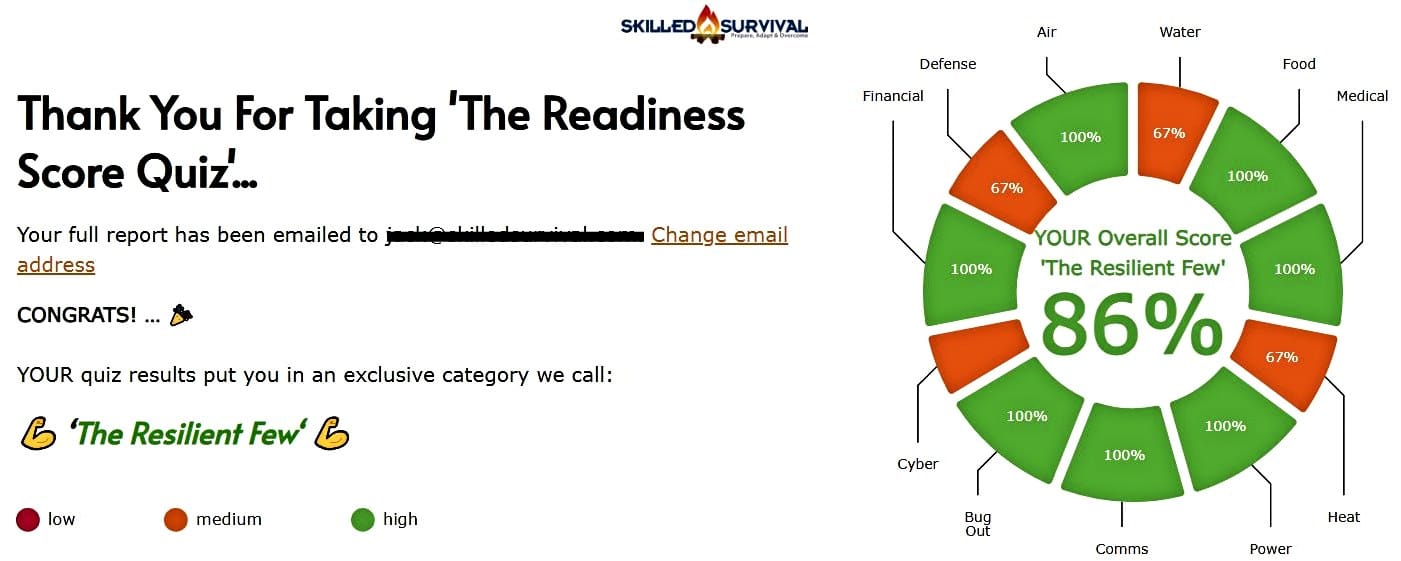
AND... I've still got a few gaps in my preps...🤔 But at least, I'm not part of 'The Fragile Masses'. 👍 Find out where YOU stand by answering a few questions...
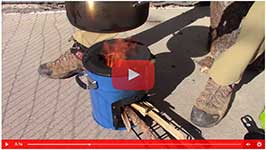
Recommended Reading
Unique Home Fortification Tactics To Punish An Invader
These home fortification tips will make criminals think twice about targeting YOUR home. I share the best home defense tactics on a budget.
7 Best Tactical Pens: A Hidden Weapon For Self Defense
The best tactical pens are innovative, strong, sleek and 100% worth carrying daily! In this guide, we review the best ones on the market to make your search easy.
13 Homemade Survival Weapons You Can Build In A Day
When all else fails, make your own homemade survival weapons. These 13 are the best and easiest DIY weapons to make in a pinch.
How To Make A Monkey Fist Knot Useful For Survival
Learn how to make a monkey's fist knot for survival. It's a versatile survival knot that could save your life someday.
Best Non-Lethal Weapons: Are They Better Than Lethal Ones?
The best non lethal weapons are innovative, versatile, effective and 100% worth carrying! In this guide, we review the best ones on the market to make your search easy.
15 New Self Defense Weapons For Insanely Strong Protection
Check out the latest self-defense weapons to protect yourself. Because there are more defend weapon choices than you realize.